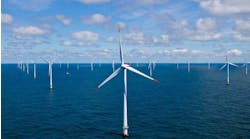NSTA urges further actions to reduce UK North Sea emissions
Britain’s North Sea operators managed to cut emissions from oil and gas production by 4% last year, according to the North Sea Transition Authority (NSTA).
The overall emissions reduction between 2028 and 2023 was 28%, with flaring levels cut by 49% over the same period. That was down to a combination of more efficient operations and stricter controls and fines for unpermitted activity, the NSTA added.
By 2040, the North Sea industry has committed achieving a 90% emissions reduction, with interim targets of halved emissions by 2030, as agreed with the UK government.
However, the NSTA’s latest Emissions Monitoring Report finds that more work is needed to ensure the industry meets/exceeds key emissions targets.
While overall emissions have come down, the greenhouse gases emitted for each barrel produced are projected to have risen, at the same time as overall UK production has also fallen.
In March the NSTA published its OGA Plan for reducing emissions, intended to put operators on track for reaching the ultimate goal of net zero by 2050.
It claims the sector’s production emissions still account for just over 3% of the UK’s entire emissions, and that gas imported from Norway through pipelines across the North Sea are still cleaner than UK production. So there is room for improvement.
The industry has been working on proposals for more than a dozen large-scale decarbonization projects, the NSTA acknowledged, most calling for electrification of platforms and flaring reduction initiatives.
TotalEnergies recently committed to investment in a flare gas recovery system at the Elgin-Franklin field in the central North Sea. The potential first-power date for a full-electrification scheme has been moved forward, and a partial electrification project has been sanctioned.
Another, electrification-ready offshore development has also received consent.
According to the NSTA, electrification, or an alternative source of low-carbon power, offers the greatest potential for emissions reductions, as fuel combustion for power generation accounts for 80% of production emissions.



